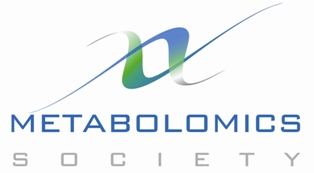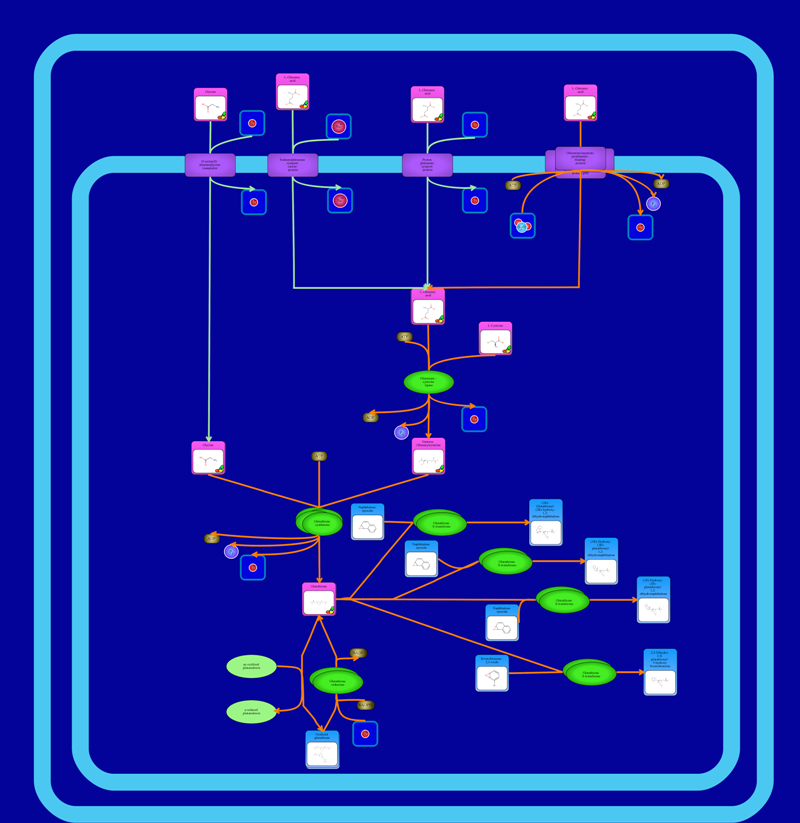
TMIC and the Metabolomics Society
Issue 54 - February 2016
CONTENTS:
Online version of this newsletter:
http://www.metabonews.ca/Feb2016/MetaboNews_Feb2016.htm

 |
| Published
in partnership between TMIC and the Metabolomics Society Issue 54 - February 2016 |
|
CONTENTS: |
|
|
 |
| TMIC
Services |
 |
Metabolomics Society News |
 WE hate to sound like a broken record, but there are several
metabolomics-themed meetings being planned for 2016, so we
hope that you will be able to identify the Official Metabolomics
Society annual meeting which is in Dublin (June 27 –
June 30, 2016).
WE hate to sound like a broken record, but there are several
metabolomics-themed meetings being planned for 2016, so we
hope that you will be able to identify the Official Metabolomics
Society annual meeting which is in Dublin (June 27 –
June 30, 2016).| |
Database Spotlight
|
 |





| |
MetaboInterview
|
| Associate
Professor, Institute of Pharmaceutical Science, King's
College London, UK |
|
 |
Biography Cristina Legido-Quigley is an Associate Professor in King’s College London in the Institute of Pharmaceutical Science, Life Sciences and Medicine. She is a group leader in clinical biomarkers and a lecturer of analytical chemistry. She studied chemistry as a mature student at King's College London, she trained in Smith Kline Beecham on turbulent flow HPLC, and then did an MSci using single-crystal X-ray diffraction. In 2004, she received a PhD by working on micro LC-MS at GSK and Imperial College London. At the University of Pavia, she was a Fellow studying molecule interactions. After this, she joined as a Postdoctoral Research Associate in Imperial College in the Department of Medicine. She moved back to King’s College London in 2006 to pursue her interest in finding clinical biomarkers of brain and liver diseases, toxicity and healthy aging. Twitter: @MetabolomicsHub |
 |
Metabolomics Current Contents
|
Metabolomics Events
|
| 11-12 Feb 2016 |
Metabolite identification with the
Q Exactive and LTQ Orbitrap The course will be taught by experts in the fields of metabolomics and chemical analysis and will include significant hands-on experience using both the Q Exactive and LTQ-Orbitrap mass spectrometers and related software/databases/libraries. The course will focus on:
For further information and registration details, please visit http://www.birmingham.ac.uk/facilities/metabolomics-training-centre/courses/metabolite-identification.aspx or contact Dr Cate Winder (C.L.Winder@bham.ac.uk). |
| 14-19 Feb 2016 |
EMBO Practical Course on
Metabolomics Bioinformatics for Life Scientists We will have lively and interactive discussion throughout the course in addition to the hands-on data analysis and processing. We encourage you to bring your data, problems you might have with a particular data set or study for group discussion. You will be asked to present your work and participate in the discussions from day one. Who is this course aimed at: This course is aimed at PhD students, post-docs and researchers with at least two or three year’s experience in the field of metabolomics who are seeking to improve their skills in metabolomics data analysis. Topics covered:
|
| 23-24 Feb 2016 |
Quality Assurance and Quality
Control in Metabolic Phenotyping
For further information and registration details, please visit http://www.birmingham.ac.uk/facilities/metabolomics-training-centre/courses/quality-phenotyping.aspx or contact Dr Cate Winder (C.L.Winder@bham.ac.uk). |
| 23-26 Feb 2016 |
Data Analysis for Metabolic
Phenotyping This 3.5-day course aims to provide an overview of
data analysis for metabolic phenotyping studies, using
data acquired from both liquid chromatography - mass
spectrometry and NMR spectroscopy.
The course does not assume any experience of coding
or statistical analysis. Please visit our website
or contact Dr Tim Ebbels (iptc@imperial.ac.uk)
for further information. |
| 21-23 Mar 2016 |
Clinical & Pharmaceutical
Solutions through Analysis Make plans to attend the 2nd Annual Metabolomics
Symposium on Clinical & Pharmaceutical Solutions
through Analysis (CPSA Metabolomics 2016). This unique
event is highly interactive and dedicated to the needs
of the clinic. The program features updated
perspectives and experiences on clinical and
pharmaceutical analysis. Imagination and stimulating
discussion are central to each CPSA Metabolomics
session and event. For more information, visit http://www.cpsa-metabolomics.com/2016/index.shtml |
| 30 Mar to 1 Apr 2016 |
The Australian & New Zealand
Metabolomics Conference (ANZMET 2016) Its aim is to promote collaboration, innovation, and community-building in metabolomics across private and government sectors by open engagement of all researchers and institutions throughout Australia and New Zealand. The conference is actively supported by the Australia & New Zealand Metabolomics Network (ANZMN), in conjunction with the Metabolomics Society and Metabolomics Australia. Several keynote speakers will present at the conference, including Professor David Wishart amongst others.
|
| 3-7 Apr 2016 |
Microscale Separations and
Bioanalysis: MSB 2016 To ensure a stimulating yet intimate environment for discussions, MSB 2016 will be limited to 275 delegates so we encourage you submit an abstract before the Jan. 15, 2016 deadline for late breaking submissions. We invite you to browse our conference website (www.msb2016.org) to learn more about our exciting scientific program. |
| 4-6 Apr 2016 |
Metabolomics with the Q Exactive
For further information and registration details, please visit http://www.birmingham.ac.uk/facilities/metabolomics-training-centre/courses/q-exactive.aspx or contact Dr Cate Winder (C.L.Winder@bham.ac.uk). |
| 17-19 Apr 2016 |
4th Workshop on Holistic Analytical
Methods for Systems Biology Studies We expect again high level presentations and an open, friendly atmosphere. We plan tutorial sessions on protocols, tips and tricks, live demonstration of software, and training session for small number of young participants with hands on PC. The first day is devoted to fundamentals/methods/protocols, the second day to health/life sciences and the last day to food/plant/nutrition. Topics:
Looking forward to seeing you in the historic port city of Thessaloniki. For more information, visit http://bioanalysis.web.auth.gr/metabolomics. |
| 18 Apr to 26 May 2016 |
Copenhagen School of Chemometrics -
2016 (CSC-2016)
How to enroll in the CSC-2016? Please, send an e-mail to Jose Amigo (jmar@food.ku.dk) with the information requested in this flyer. |
| 20-22 Apr 2016 |
Multiple biofluid and tissue types,
from sample preparation to analysis strategies for
metabolomics
|
| 30 May-2 Jun 2016 |
10th conference of the Francophone
Metabolomics and Fluxomics Society (RFMF)
|
| 27-30 Jun 2016 |
Metabolomics 2016 The conference programme will cover all aspects of metabolomics under five broad themes: Metabolomics in Nutrition and Food Research, Metabolomics in Health and Disease, Advancing the Field, Environmental, Plant and Model Organisms. For further details, visit http://metabolomics2016.org. |
Metabolomics Jobs |
This is a resource for advertising positions in
metabolomics. If you have a job you would like posted in this
newsletter, please email Ian Forsythe (metabolomics.innovation@gmail.com).
Job postings will be carried for a maximum of four issues
(eight weeks) unless the position is filled prior to that
date.
Jobs Offered
| Job Title | Employer | Location | Posted | Closes | Source |
|---|---|---|---|---|---|
| Experimental Officer in NMR Computational
Metabolomics, Phenome Centre |
University of Birmingham | Birmingham, UK | 27-Jan-2016 |
25-Feb-2016 | Metabolomics Society Jobs |
| NMR Metabolomics Technician, Phenome Centre |
University of Birmingham | Birmingham, UK | 27-Jan-2016 | 25-Feb-2016 | Metabolomics Society Jobs |
| Postdoctoral Opportunity, Section of Nutrition and Metabolism / Biomarkers Group |
International Agency for Research on Cancer |
Lyon, France |
21-Jan-2016 | 15-Feb-2016 |
International
Agency for Research on Cancer |
| Assistant Professor - Metabolomics |
Auburn University | Auburn, AL, USA |
12-Jan-2016 | Until filled | Auburn University |
| Senior Fellow (Postdoctoral) Position |
University of Washington | Seattle, WA, USA |
11-Dec-2015 |
Until filled | Metabolomics Society Jobs |
|
Ian J. Forsythe Double AB, MSc Editor, MetaboNews Department of
Computing Science
University of Alberta 221 Athabasca Hall Edmonton, AB, T6G 2E8, Canada Email: metabolomics.innovation@gmail.com Website: http://www.metabonews.ca LinkedIn: https://www.linkedin.com/in/ijforsythe Twitter: http://twitter.com/MetaboNews Google+: https://plus.google.com/118323357793551595134 Facebook: http://www.facebook.com/metabonews |
This newsletter is published in
partnership between The Metabolomics Innovation Centre
(TMIC, http://www.metabolomicscentre.ca/) and the Metabolomics
Society (http://www.metabolomicssociety.org)
for the benefit of the worldwide metabolomics
community.
|